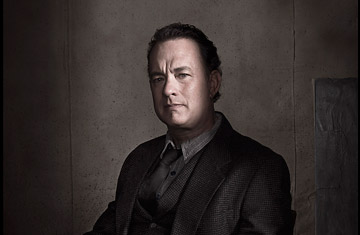
(4 of 7)
For the past decade, Hanks has worked overtime to support the National World War II Museum in New Orleans--a pet project of the late historian Stephen Ambrose, on whose book Band of Brothers was based. On March 2, the museum, which will soon open a Pacific-theater wing, hosted a reception after a local screening of The Pacific, attended by the last wave of old-timers who consider V-J day a personal accomplishment. Wherever Hanks travels, veterans accost him with thank-yous. "It's pretty heady," Hanks says. "But now the Korean War guys have started coming up to me, saying, 'Hey, what about us?' I get good-natured guff from so many veterans saying things like, 'When you going to do something on Vietnam?' And the fact that I hadn't worked on a Pacific War project--forget about it! Those guys would say to me things like, 'If you ain't telling the story of Saipan, you ain't tellin' the story of World War II.'"
History as Entertainment
For an old Saturday Night Live--style comedian, there is a seriousness of purpose about Hanks as history maker. At 53, he has a repertoire that doesn't include anarchy; he's no longer the romantic-comedy clown. In fact, he exhibits a crabbed resentment toward historical amnesia--most notably his own. Echoing McCullough, who rails against American historical illiteracy, the self-deprecating goof in Hanks nevertheless makes light of his own campaign against historical ignorance. While gag lines are still his forte, his new rallying cry is a palm smacking the forehead: "Why didn't somebody tell me that!"
He eventually taught himself. As a teenager, Hanks was a straight arrow wanting to earn a decent paycheck. He believed in the American Dream, and the Vietnam War made him uneasy. The closest Hanks got to protesting Vietnam, however, was privately rooting for the Smothers Brothers, whose show was eventually canceled by CBS because of their antiwar banter. Immune to Berkeley radicalism and too "unhip"--his word--for Richard Pryor or Lenny Bruce, Hanks' comedic sensibility tilted more toward Bob Hope. Hanks was so square that he remembers rebuking a peer in his high school government class for saying in April 1974 that President Richard Nixon would be forced to resign. "I was historically smart enough to know that Presidents didn't just quit," Hanks says. "Not in America! That just doesn't happen!"
